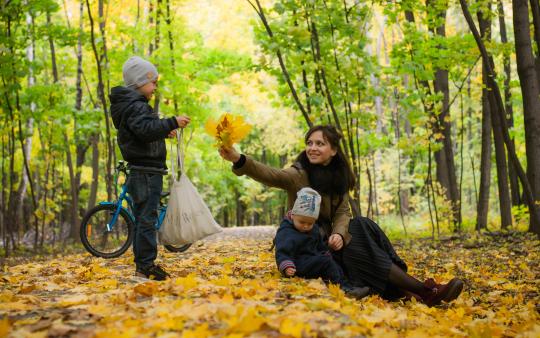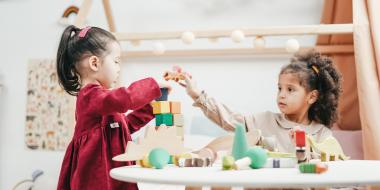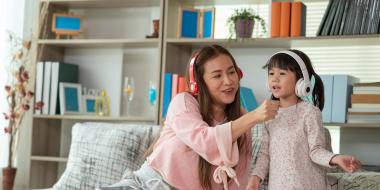Parents are always looking to fill their parenting toolbox with strategies and techniques to help them through challenges with their children. Playfulness lightens the mood and reduces stress. It is particularly effective for younger children.
Young children live in a world of imaginative play. They are full of curiosity and wonder. Children work out their thoughts, feelings and ideas through play; it is real work for them. In particular, transitions can be a challenge because children become so engrossed in what they are doing that breaking that concentration causes frustration.
Benefits of Playfulness in Relationships
When an adult or caregiver enters the world of play and imagination, an incredible connection is made. You are no longer an outside force but a collaborator and engaged participant in your child’s world.
Children are more willing to listen when they feel heard and understood. By speaking their language of playfulness, you have a greater chance of understanding and connection. Deep down, all children want to feel loved and accepted. You are showing them by your actions that you enjoy being around them and have fun with them.
When tensions run high, having fun and being silly can lighten the mood. Breaking down the walls of frustration helps your child to relax. An anxious or angry child will operate from a survival state of fight, flight or freeze; this means that they will not cooperate. On the other hand, a calm child is better able to problem solve, accept changes and guidance.
Learning through Play
Imagine your child is fighting you to get dressed. You feel the need for them to change out of their pyjamas and into regular clothes for the day, but of course your toddler is not cooperating. Try putting their clothes on wrong in an exaggerated manner. Your child might start to laugh and giggle, then begin to show you how to dress them properly. Another fun way to dress is to try and put their clothes on yourself. Your toddler will be quick to correct you and happily put the clothes on to show you that it fits them. Lots of laughs and giggles and your child is dressed and ready for the day.
If cleaning up toys is becoming a chore, you could turn it into a game.
-
A game of I spy, looking for different colours and shapes to put into the basket.
-
A challenge to pick up toys while the music is playing
-
An imaginative game using trucks to help move the toys to the proper bins
Helping with Transitions
-
Sing a song to say goodbye to one activity before moving on to the next
-
Walk or move like an animal to move to the next location
-
Help a stuffed toy or doll with moving on to the next part of the day
-
Go on a secret mission to surprise another family member while getting ready for the next activity
-
Cuddle, chase and rough house into the next part of your day
Nurturing Connection
When your child sees that you are having fun and enjoying their company, they feel loved. That unconditional love and acceptance meets a deep longing in each of us. When you have a strong connection with your child, small bumps in the road are handled with greater patience and empathy.
Please share with us the fun ways you interacted with your child by tagging @ecoparent on social media.
You may also enjoy: Simplicity Parenting in a World That Asks Too Much, Self-Reliance Skills Help Children Navigate Their World, and Healthy Lifestyle Habits For Child Development.






